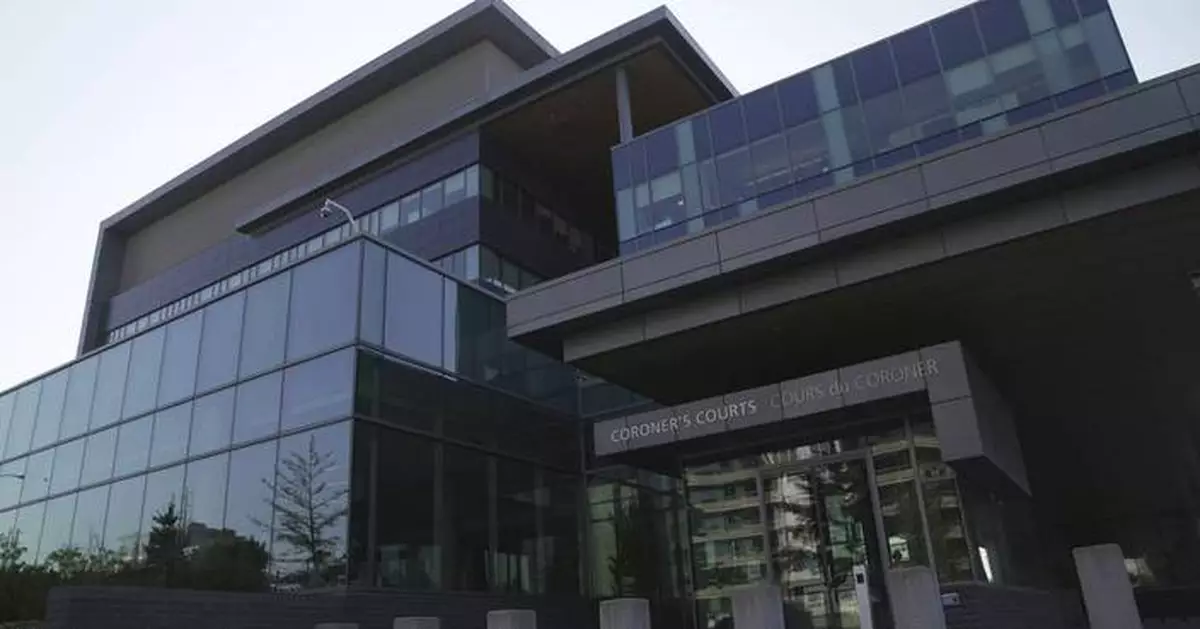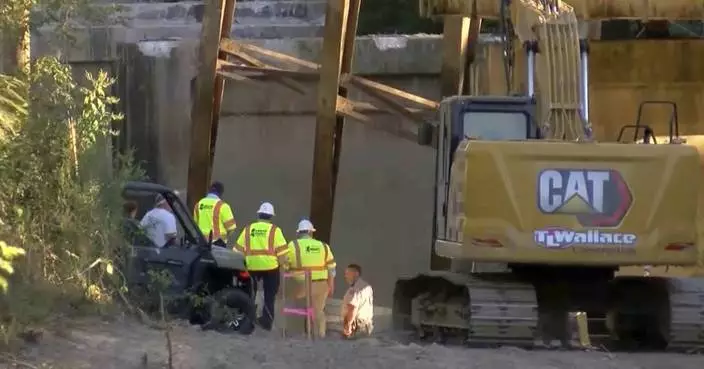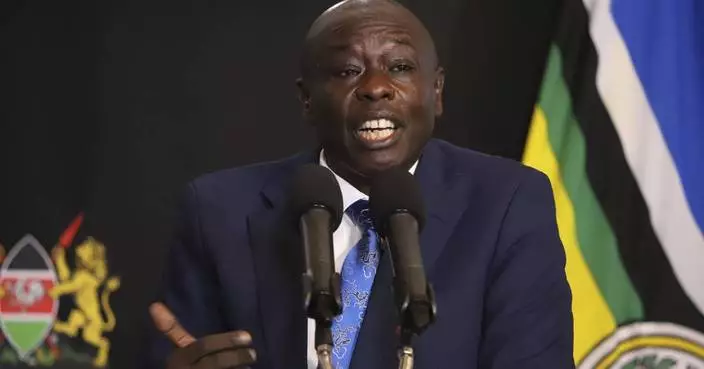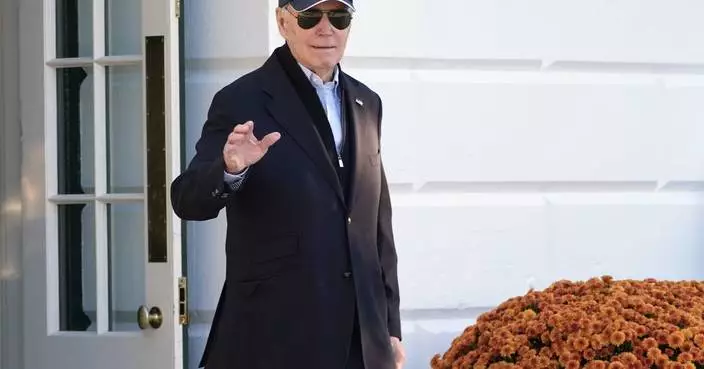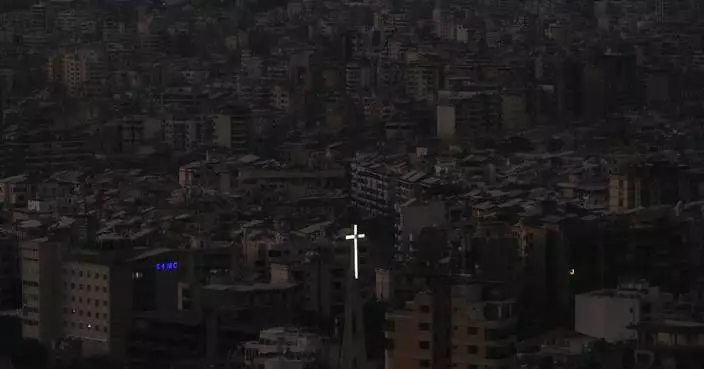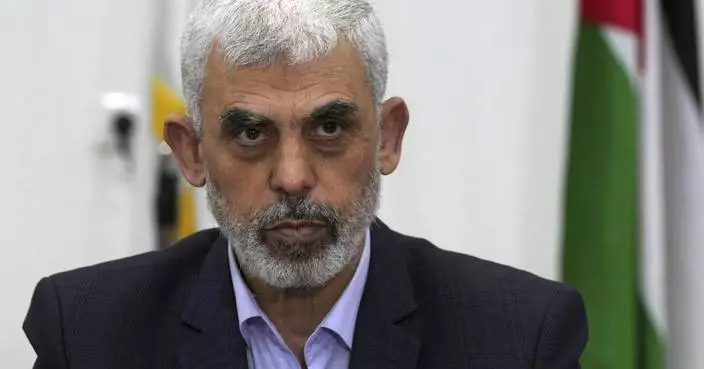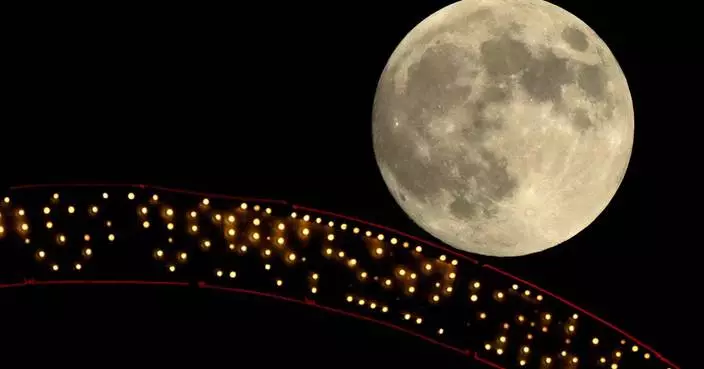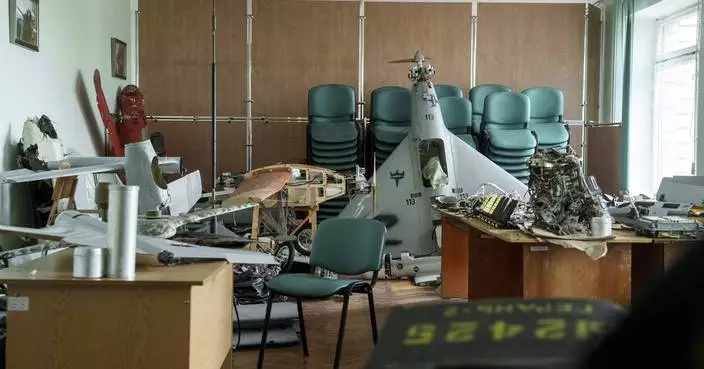LONDON (AP) — An expert committee reviewing euthanasia deaths in Canada’s most populous province has identified several cases where patients asked to be killed in part for social reasons such as isolation and fears of homelessness, raising concerns over approvals for vulnerable people in the country's assisted dying system.
Ontario’s chief coroner issued several reports Wednesday — after an Associated Press investigation based in part on data provided in one of the documents — reviewing the euthanasia deaths of people who weren’t terminally ill. The expert committee's reports are based on an analysis of anonymized cases, chosen for their implications for future euthanasia requests.
Canada’s legal criteria require a medical reason for euthanasia — a fatal diagnosis or unmanageable pain — but the committee's reports show cases where people were euthanized based on other factors including an “unmet social need.”
AP's investigation found doctors and nurses privately struggling with euthanasia requests from vulnerable people whose suffering might be addressed by money, social connections or adequate housing. Providers expressed deep discomfort with ending the lives of vulnerable people whose deaths were avoidable, even if they met the criteria in Canada's euthanasia system, known nationally as MAiD, for medical assistance in dying.
“To finally have a government report that recognizes these cases of concern is extremely important,” said Dr. Ramona Coelho, a doctor on the expert committee. “We’ve been gaslit for so many years when we raised fears about people getting MAiD because they were poor, disabled or socially isolated."
In the case of a man identified as Mr. A, Ontario's expert committee questioned whether authorities tried hard enough to relieve his pain before he was euthanized. Mr. A was an unemployed man in his 40s with bowel disease and a history of substance abuse and mental illness. He was described as “socially vulnerable and isolated.” Some committee members were alarmed that a psychiatrist suggested euthanasia during a mental health assessment.
Mr. A was eventually picked up and driven to the location where he was killed by the health professional who euthanized him — a transgression of professional boundaries, according to some committee members. They said that might have “created pressure and gave rise to a perception of hastening a person towards death."
Another case detailed Ms. B, a woman in her 50s suffering from multiple chemical sensitivity syndrome, with a history of mental illness including suicidality and post-traumatic stress disorder. She was socially isolated and asked to die largely because she could not get proper housing, according to the report.
Committee members couldn’t agree whether her death was justified; some said that because her inadequate housing was the main reason for her suffering, she should have been disqualified from euthanasia. Others argued that “social needs may be considered irremediable” if other options have been explored.
Dr. Sonu Gaind, professor of medicine at the University of Toronto, said the coroner’s reports are alarming for numerous reasons, notably the handling of mental health conditions in those seeking euthanasia.
“What we’re doing in many cases is the opposite of suicide prevention,” he said, citing an example of a man in his 40s who had previously tried to kill himself and did not have a definitive diagnosis when his euthanasia was approved.
Dr. Scott Kim, a physician and bioethicist at the National Institutes of Health in Washington, said the real issue is the permissive nature of Canada's law. Despite polls showing widespread support for expanding euthanasia access, he questioned whether most Canadians understand what is allowed and said it's “baffling” that officials hadn't previously considered these issues.
The expert committee made numerous recommendations, including assigning patient advocates to support people considering euthanasia and providing more guidance to doctors and nurses who assess requests from nonterminal patients.
The committee noted that legally mandated safeguards likely were not met in nearly 2% of cases. Despite that, experts say, no doctors or nurses have ever been prosecuted.
Trudo Lemmens, professor of health law and policy at the University of Toronto, said medical professional bodies and judicial authorities in Canada appeared “unwilling to curtail practices that appear ethically problematic.”
“Either the law is too broad, or the professional guidance not precise enough,” Lemmens said. “Or it is simply not seen as a priority to protect some of our most vulnerable citizens.”
So far, Ontario is the only province or territory in Canada to release summaries of cases that could signal problems in euthanasia approvals.
AP’s investigation also found data suggesting a significant number of people euthanized in Ontario when they weren't dying live in the province's poorest and most deprived areas. On Wednesday, the Ontario coroner released that as well, showing that people asking to be killed were more likely to require disability support and be socially isolated.
The Associated Press Health and Science Department receives support from the Howard Hughes Medical Institute’s Science and Educational Media Group. The AP is solely responsible for all content.
A previous version of this story misspelled the name of a doctor on the expert committee. Her name is Dr. Ramona Coelho.
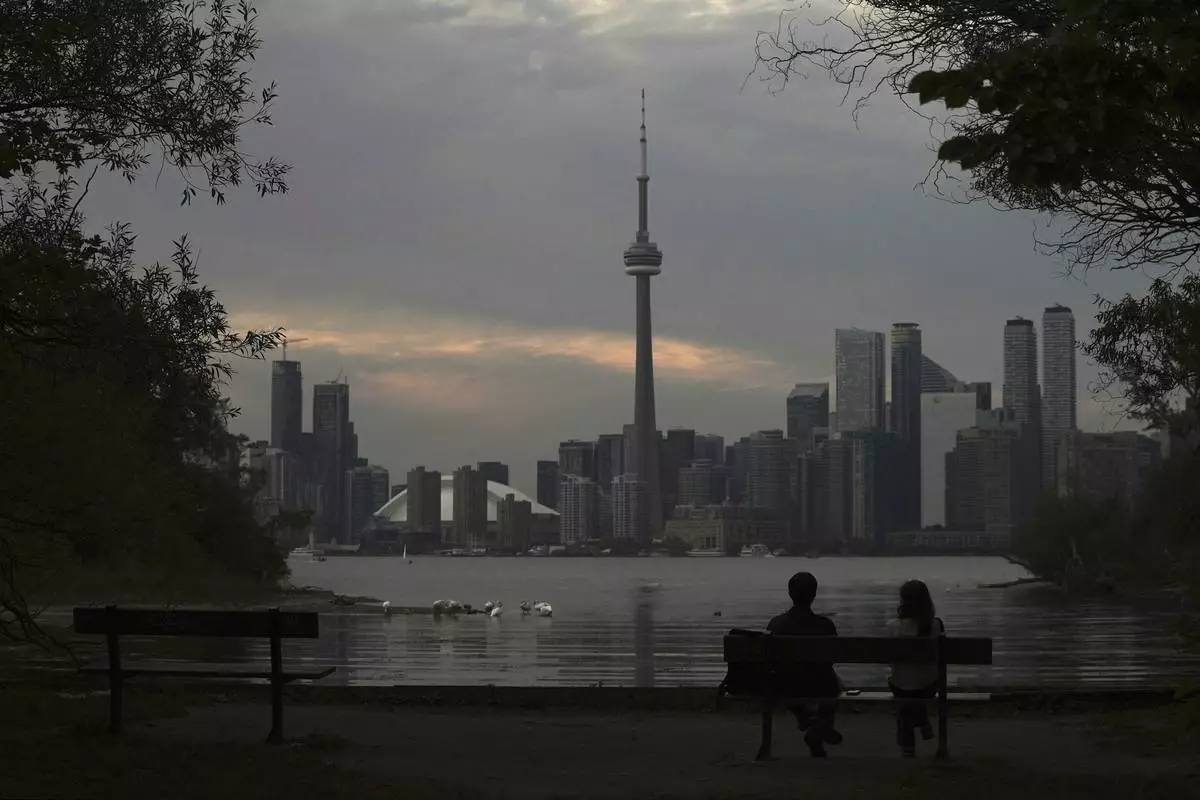
The Toronto skyline is seen from Wards Island in Toronto on Thursday, Sept. 19, 2024. (AP Photo/Angie Wang)
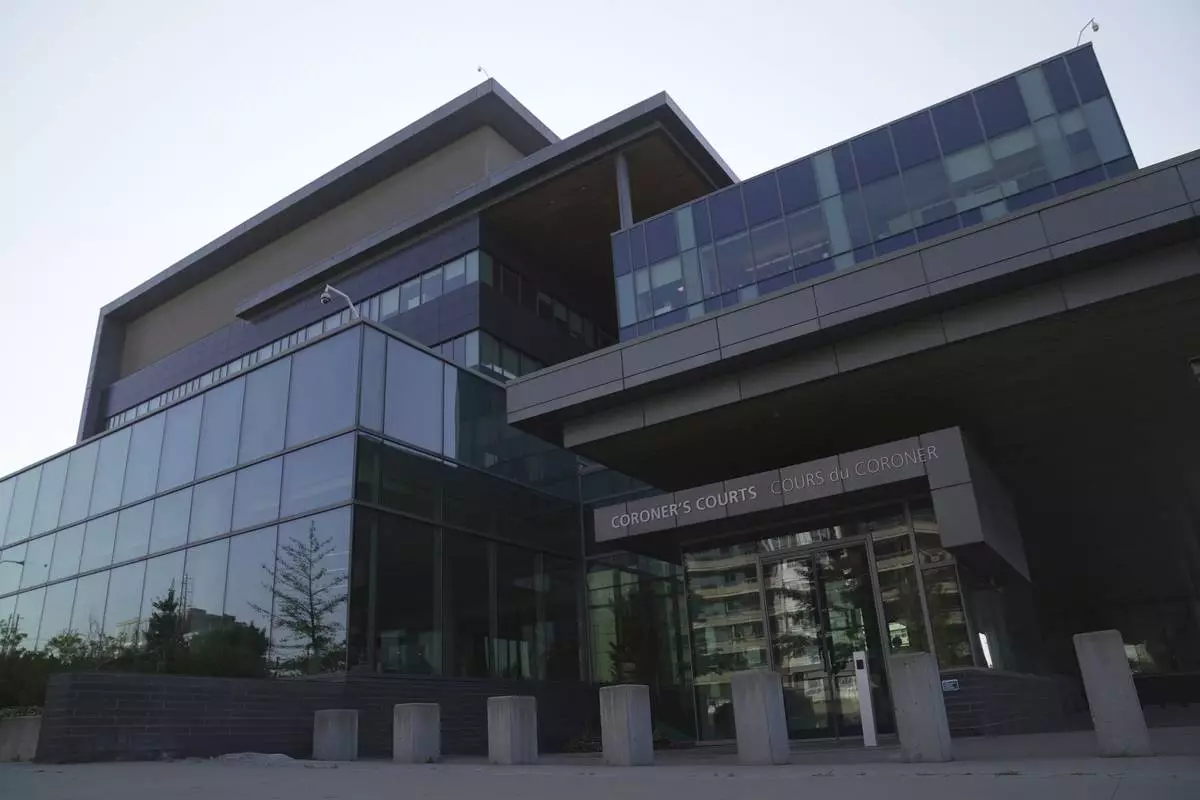
The Office of the Chief Coroner: Ontario is seen in Toronto on Thursday, Sept. 19, 2024. (AP Photo/Angie Wang)
With three weeks left in the presidential campaign, Democrat Kamala Harris is spending most of her days trying to shore up support in the “blue wall” states of Pennsylvania, Michigan and Wisconsin as she tries to avoid a repeat of Hillary Clinton’s collapse there eight years ago.
Her schedule reflects the Democratic nominee’s focus on her most likely path to victory over Republican candidate Donald Trump. Harris’ campaign says she’s not ceding ground in Sun Belt states like North Carolina, Georgia, Arizona and Nevada even though most of her time is spent elsewhere.
The vice president campaigned at a hockey rink on Monday in Erie, Pennsylvania, where she denounced Republican candidate Donald Trump as “unhinged.” She visited an art gallery in Detroit with actors Don Cheadle, Delroy Lindo and Cornelius Smith. Jr. on Tuesday, then recorded a radio town hall with Charlamagne tha God.
On Wednesday, Harris was back in Pennsylvania to stress allegiance to the Constitution as she stood just steps from the banks of the Delaware River, where George Washington crossed with his troops in a pivotal moment of the Revolutionary War.
Her pace doesn’t let up for the rest of the week.
Harris is headed back to Milwaukee Thursday as she seeks support from college-age voters.
She’ll drop by a business class at University of Wisconsin-Milwaukee, then hold a student rally at University of Wisconsin-La Crosse. She closes out the day with a rally in Green Bay.
The vice president is expected to hold meet-and-greets in Michigan on Friday. She then campaigns in Detroit on Saturday.
Follow the AP’s Election 2024 coverage at: https://apnews.com/hub/election-2024.
Here’s the latest:
Democratic presidential nominee Kamala Harris said Thursday the killing of Hamas’ top leader, Yahya Sinwar, by Israel “gives us an opportunity to finally end the war in Gaza.”
Speaking from a Wisconsin college campus where she was campaigning, Harris said the war “must end such that Israel is secure, the hostages are released, the suffering in Gaza ends and the Palestinian people can realize their right to dignity, security, freedom and self-determination.”
“It is time for the day after to begin,” she said.
As she arrived to the University of Wisconsin-Milwaukee campus, protesters shouted outside “Free, free Palestine.”
Israel says Sinwar was killed in a battle with Israeli forces in Gaza. Iaraeli Foreign Minister Katz called Sinwar’s killing a “military and moral achievement for the Israeli army.”
Sinwar was a chief architect of Hamas’ Oct. 7, 2023, attack on southern Israel that precipitated the war and escalating conflicts across the Middle East.
Former NBC News anchor Brian Williams will be working again on election night, anchoring a live special with results and analysis to stream on Amazon Prime Video.
Amazon announced the plans on Thursday, saying the election night streamcast will begin at 5 p.m. Eastern, with no end time given. His longtime NBC colleague, Jonathan Wald, will be executive producer.
An election night telecast is a new frontier for a big streaming service, one that doesn’t have its own news operation. Prime Video was scant on details in a news release, saying the show will have results from third-party news sources and a variety of as-yet unnamed guests to talk about them.
Williams and Wald were not immediately available, according to Amazon.
Democratic vice presidential candidate Tim Walz is making the talk show rounds with scheduled appearances on “The View,” and “The Daily Show.”
The Minnesota governor will appear on both shows Monday, with just a few weeks to go before the presidential election. He’s heading to ABC’s “The View” after Kamala Harris was on Oct. 8. Her appearance delivered the longtime talk show’s highest ratings in three and a half years, according to ABC.
Walz will be interviewed on Comedy Central’s popular talk show by Jon Stewart, campaign officials said. Stewart, the show’s longtime leader, has come back to host once a week on Mondays.
Early in-person voting began statewide Thursday in the presidential battleground of North Carolina, including in mountainous areas where thousands of potential voters still lack power and clean running water after Hurricane Helene’s epic flooding.
More than 400 locations in all 100 counties were slated to open for the 17-day early vote period, said State Board of Elections Executive Director Karen Brinson Bell. Only four of 80 sites in the 25 western counties hardest hit by the storm weren’t going to open.
Helene’s arrival three weeks ago in the Southeast decimated remote towns throughout Appalachia and killed at least 246 people, with a little over half of the storm-related deaths in North Carolina. It was the deadliest hurricane to hit the U.S. mainland since Katrina in 2005.
Early in-person voting, which continues through Nov. 2, is very popular in North Carolina. More than 3.6 million ballots — 65% of all cast ballots — were cast this way in the 2020 general election. In the 2016 election, 62% of all cast ballots were cast during early in-person voting.
Absentee voting in North Carolina began a few weeks ago, with over 67,000 completed ballots turned in so far, election officials said. People displaced by Helene are being allowed to drop off their absentee ballot at any early voting site in the state.
On Thursday, Democratic vice presidential nominee Tim Walz was expected to campaign in Winston-Salem and in Durham, where he was to be joined by former President Bill Clinton.
South Dakota Gov. Kristi Noem, U.S. Sen. Cindy Hyde-Smith of Mississippi and Republican National Committee Chairman Michael Whatley were expected to appear on the “Team Trump Bus Tour” when it resumes Thursday in Rutherford County, which was among the hardest-hit areas.
As President Joe Biden left the White House on his way to Germany Thursday, he was asked about Donald Trump’s recent social media post that Kamala Harris was “the worst vice president in history.” Biden, walking from the White House to Marine One on the South Lawn, stopped and said: “You don’t listen to Donald Trump, do ya?”
Biden hasn’t had any nice words for the Republican nominee, calling him a “loser” during a campaign event earlier this week. He also said that Harris, if elected, would cut her own path as president and her “perspective on our problems will be fresh and new. Donald Trump’s perspective is old and failed and quite frankly, thoroughly totally dishonest.”
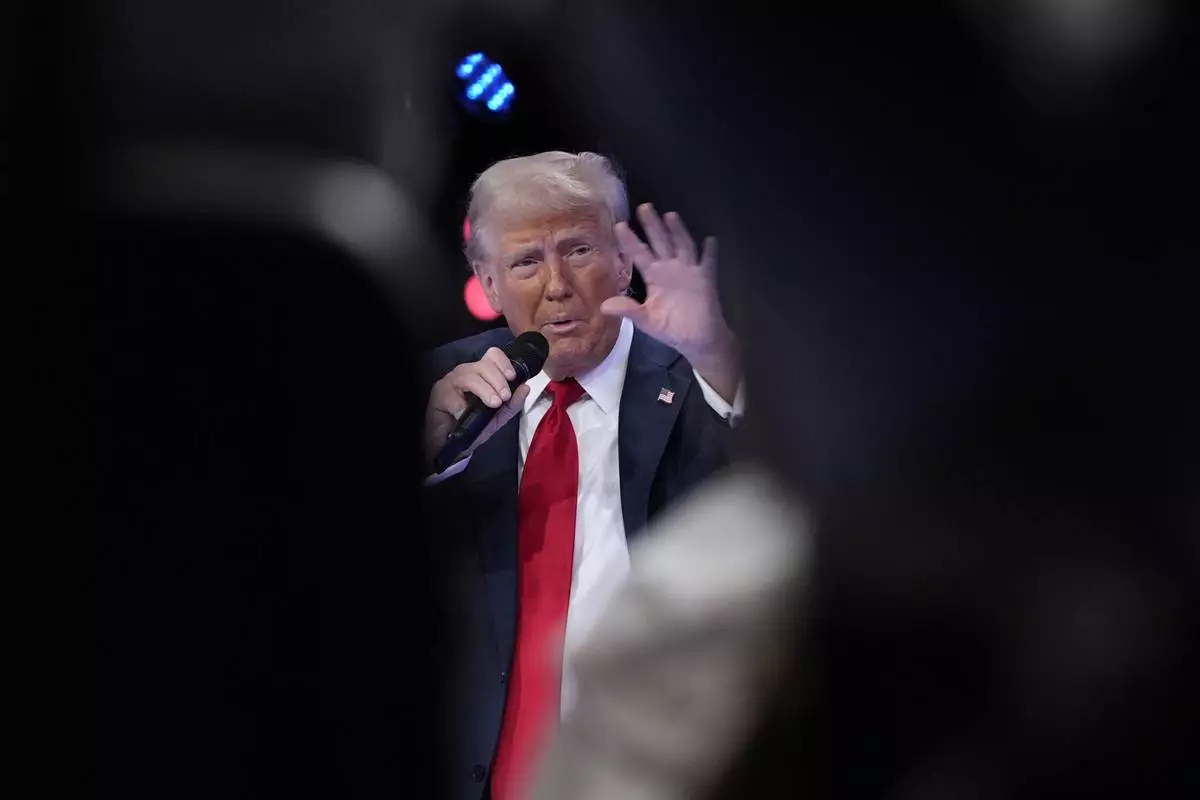
Republican presidential nominee former President Donald Trump speaks during a Univision town hall, Wednesday, Oct. 16, 2024, in Doral, Fla. (AP Photo/Alex Brandon)
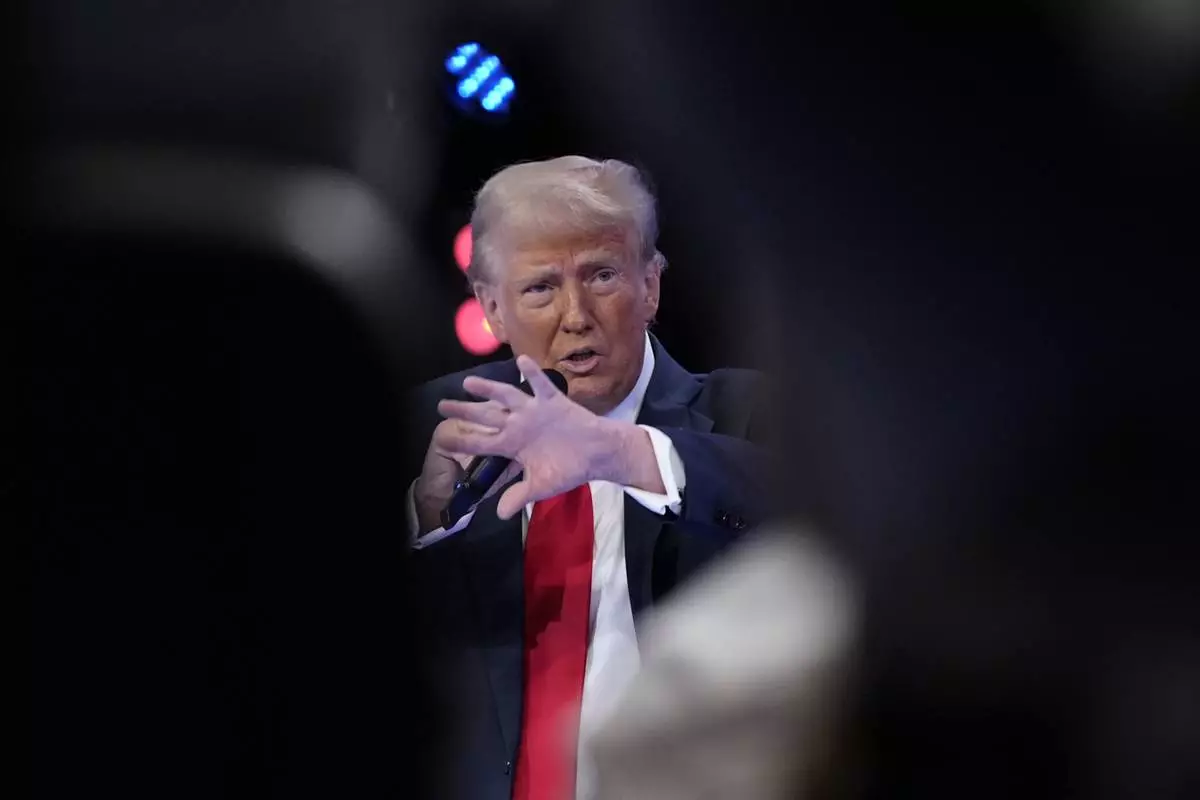
Republican presidential nominee former President Donald Trump speaks during a Univision town hall, Wednesday, Oct. 16, 2024, in Doral, Fla. (AP Photo/Alex Brandon)

A supporter greets Republican presidential nominee former President Donald Trump after a campaign event at the Cobb Energy Performing Arts Centre, Tuesday, Oct. 15, 2024, in Atlanta. (AP Photo/Alex Brandon)
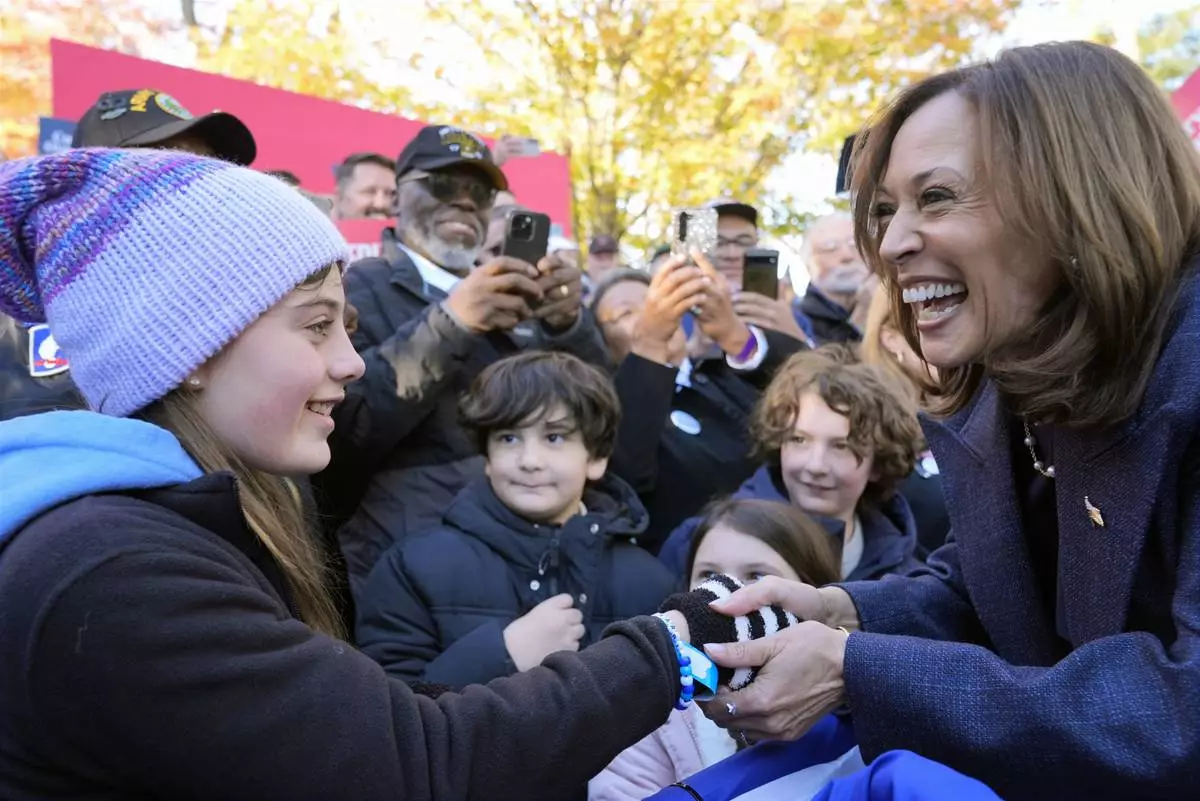
Democratic presidential nominee Vice President Kamala Harris greets people at a campaign event at Washington Crossing Historic Park, Wednesday, Oct. 16, 2024, in Washington Crossing, Pa. (AP Photo/Jacquelyn Martin)
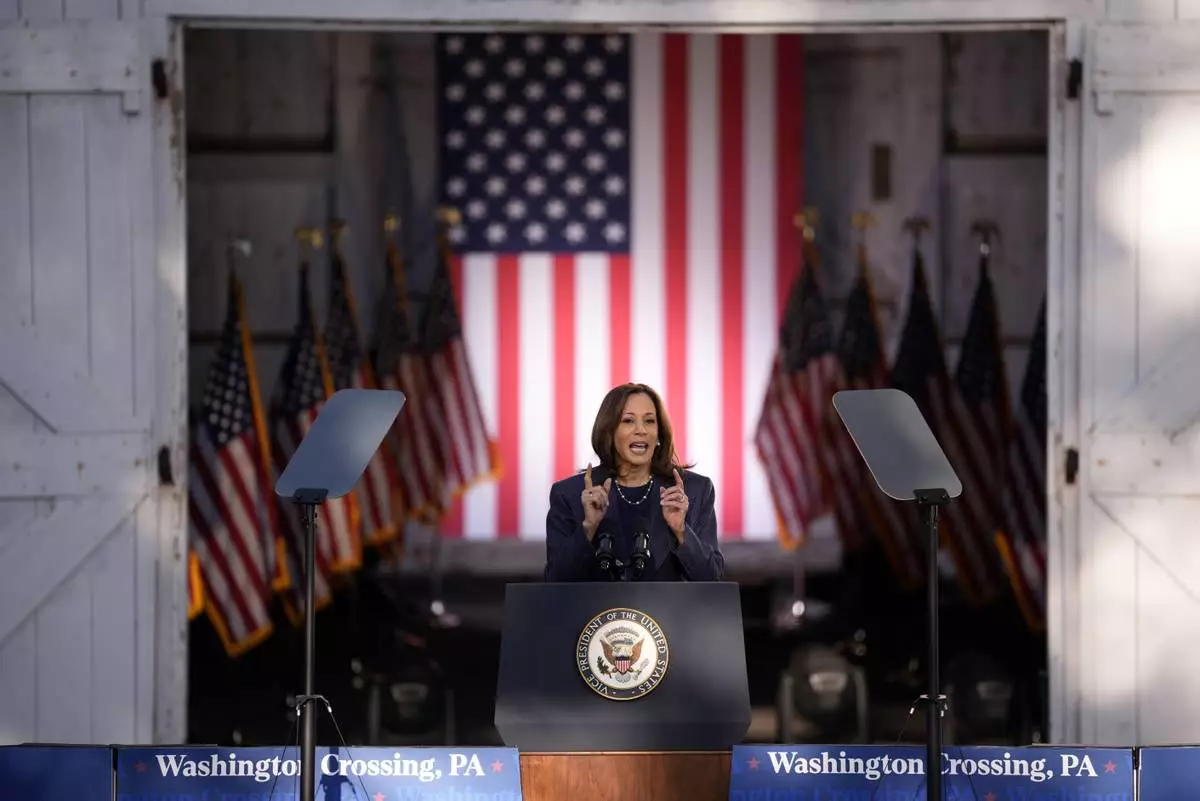
Democratic presidential nominee Vice President Kamala Harris speaks during a campaign event at Washington Crossing Historic Park, Wednesday, Oct. 16, 2024, in Washington Crossing, Pa. (AP Photo/Matt Slocum)
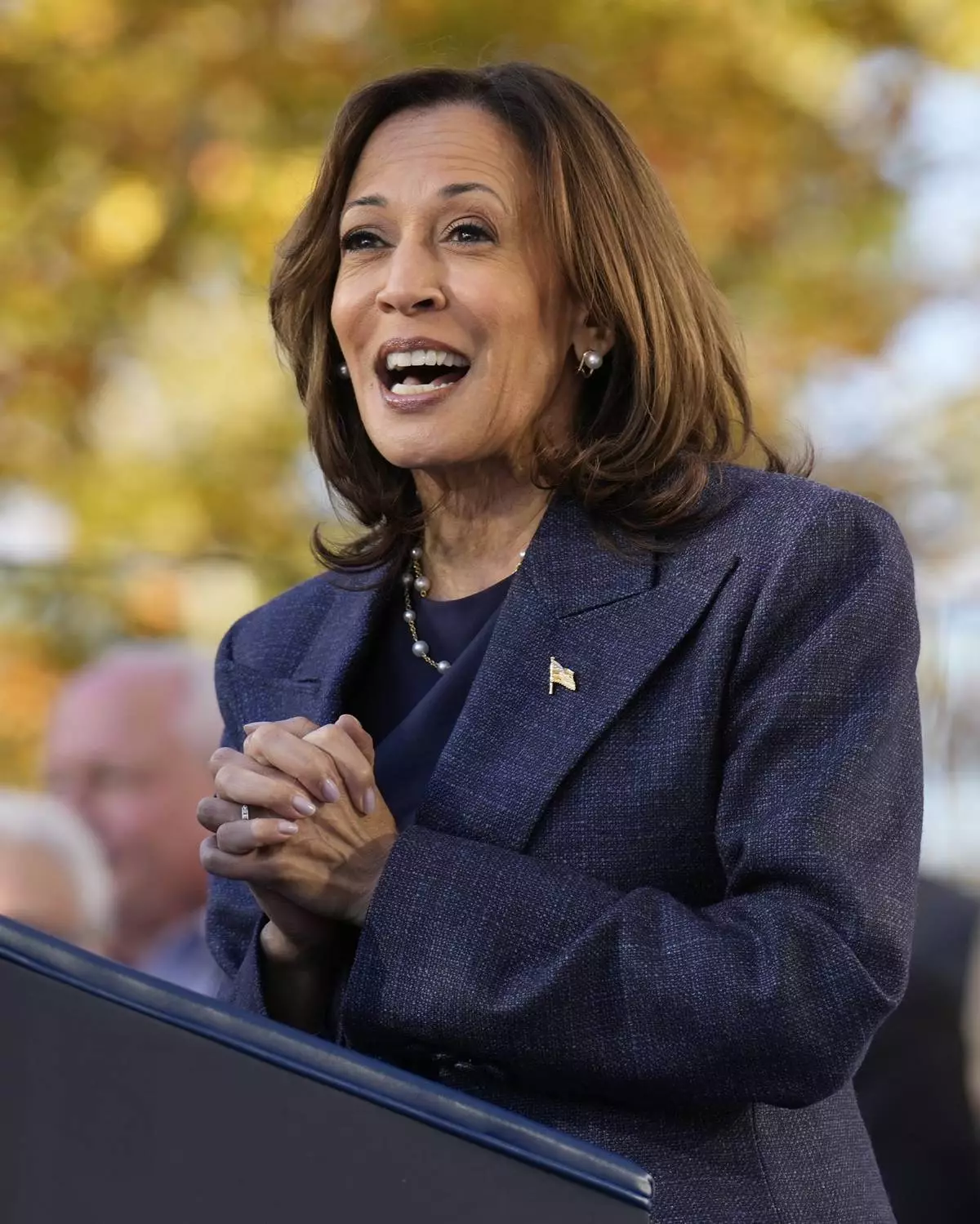
Democratic presidential nominee Vice President Kamala Harris speaks during a campaign event at Washington Crossing Historic Park, Wednesday, Oct. 16, 2024, in Washington Crossing, Pa. (AP Photo/Jacquelyn Martin)
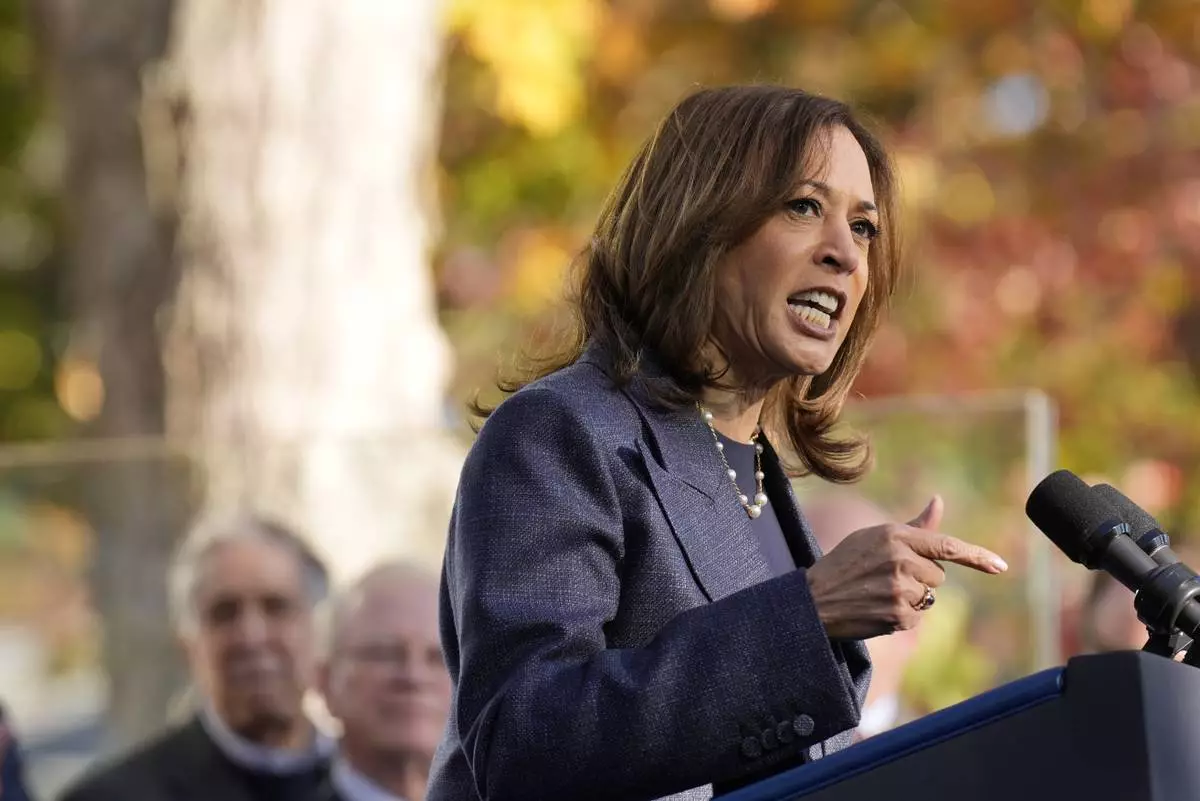
Democratic presidential nominee Vice President Kamala Harris speaks at a campaign event at Washington Crossing Historic Park, Wednesday, Oct. 16, 2024, in Washington Crossing, Pa. (AP Photo/Jacquelyn Martin)




